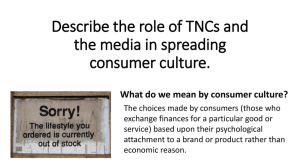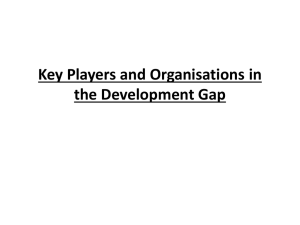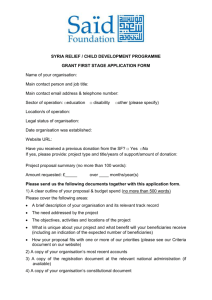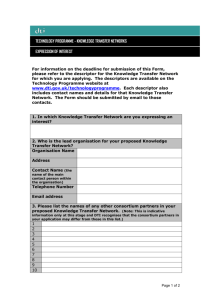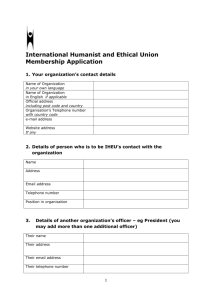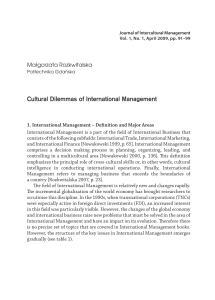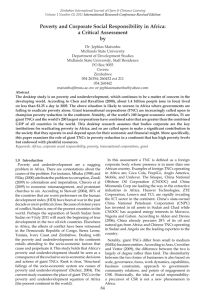Glossary - Baby Milk Action
advertisement
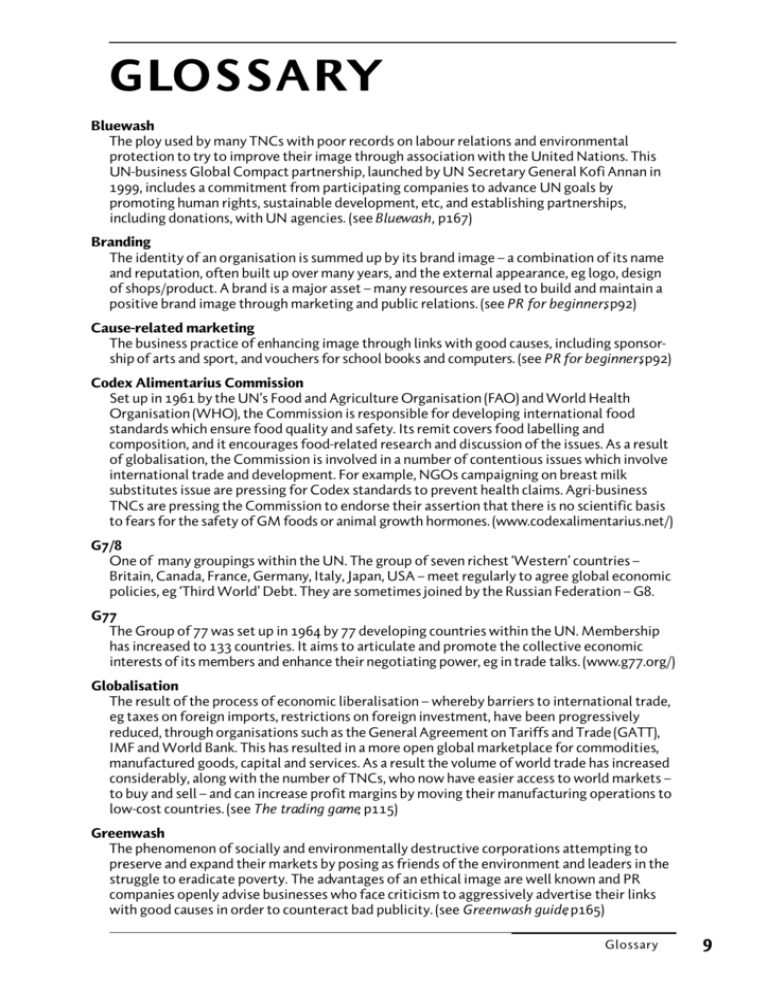
G LO S S A RY Bluewash The ploy used by many TNCs with poor records on labour relations and environmental protection to try to improve their image through association with the United Nations. This UN-business Global Compact partnership, launched by UN Secretary General Kofi Annan in 1999, includes a commitment from participating companies to advance UN goals by promoting human rights, sustainable development, etc, and establishing partnerships, including donations, with UN agencies. (see Bluewash, p167) Branding The identity of an organisation is summed up by its brand image – a combination of its name and reputation, often built up over many years, and the external appearance, eg logo, design of shops/product. A brand is a major asset – many resources are used to build and maintain a positive brand image through marketing and public relations. (see PR for beginners, p92) Cause-related marketing The business practice of enhancing image through links with good causes, including sponsorship of arts and sport, and vouchers for school books and computers. (see PR for beginners, p92) Codex Alimentarius Commission Set up in 1961 by the UN’s Food and Agriculture Organisation (FAO) and World Health Organisation (WHO), the Commission is responsible for developing international food standards which ensure food quality and safety. Its remit covers food labelling and composition, and it encourages food-related research and discussion of the issues. As a result of globalisation, the Commission is involved in a number of contentious issues which involve international trade and development. For example, NGOs campaigning on breast milk substitutes issue are pressing for Codex standards to prevent health claims. Agri-business TNCs are pressing the Commission to endorse their assertion that there is no scientific basis to fears for the safety of GM foods or animal growth hormones. (www.codexalimentarius.net/) G7/8 One of many groupings within the UN. The group of seven richest ‘Western’ countries – Britain, Canada, France, Germany, Italy, Japan, USA – meet regularly to agree global economic policies, eg ‘Third World’ Debt. They are sometimes joined by the Russian Federation – G8. G77 The Group of 77 was set up in 1964 by 77 developing countries within the UN. Membership has increased to 133 countries. It aims to articulate and promote the collective economic interests of its members and enhance their negotiating power, eg in trade talks. (www.g77.org/) Globalisation The result of the process of economic liberalisation – whereby barriers to international trade, eg taxes on foreign imports, restrictions on foreign investment, have been progressively reduced, through organisations such as the General Agreement on Tariffs and Trade (GATT), IMF and World Bank. This has resulted in a more open global marketplace for commodities, manufactured goods, capital and services. As a result the volume of world trade has increased considerably, along with the number of TNCs, who now have easier access to world markets – to buy and sell – and can increase profit margins by moving their manufacturing operations to low-cost countries. (see The trading game, p115) Greenwash The phenomenon of socially and environmentally destructive corporations attempting to preserve and expand their markets by posing as friends of the environment and leaders in the struggle to eradicate poverty. The advantages of an ethical image are well known and PR companies openly advise businesses who face criticism to aggressively advertise their links with good causes in order to counteract bad publicity. (see Greenwash guide, p165) Glossary 9 International Monetary Fund (IMF) Set up in 1944, this specialised financial agency of the United Nations was part of a system (along with the World Bank) which aimed to stabilise the world economy. It promotes international monetary cooperation and the growth of world trade, and stabilises foreign exchange rates. Since the early 1970s is has been forcing the liberalisation of the world economy. (www.imf.org/; see The trading game, p115) Lobbying The practice used by organisations trying to persuade policy makers to favour their interests. Both NGOs and TNCs lobby politicians and policy makers, but business has more resources at its disposal. Methods include making donations to political parties, setting up Business Interest NGOs (BINGOs), and employing professional lobbying consultants who have direct access to the corridors of power. Influential BINGOs include the International Chamber of Commerce (ICC) and the Business Council for Sustainable Development (BCSD). (see PR for beginners, p92 and Behind the scenes, p172) Neo-liberalism The dominant economic ideology which gained favour from the early 1970s. The basic assumptions are that competition and the market place – the laws of supply and demand – are the most effective way of organising an economy and meeting human needs; that competition forces businesses or countries to specialise in what they do best and ensures efficiency; that anything which gets in the way of the free flow of commodities, goods, services and capital – state-run industry or services, government regulations, trade unions, subsidies – must be removed or reduced. In the area of world trade, TNCs – major beneficiaries of free trade – have pushed the liberalisation agenda through the IMF, World Bank and World Trade Organisation, and have seen their power and wealth grow in the resulting more open globalised marketplace. (see The trading game, p115) Non-governmental organisation (NGO) Private agencies of an educational, charitable or research nature which are concerned with a wide range of economic, environmental and social issues – ranging from global warming and development, to human rights. They operate in all countries and at different levels – local, national and international. Some raise money for good causes, others campaign to raise public awareness of important issues and aim to change government policies. TNCs form NGOs – Business Interest NGOs (BINGOs) to further their interests. These are very different in their aims and objectives from Public Interest NGOs (PINGOs). BINGOs often pretend to be PINGOs – it is important to distinguish them from the genuine article. North also known as developed countries Shorthand for the industrialised countries of the European Union, North America and Japan, first used by the 1980 ‘Brandt Report’ which described the under-development of the poor countries (most found south of a line drawn across the globe) by the rich nations of the ‘North’. Organisation for Economic Co-operation and Development (OECD) The OECD began in 1947 as the Conference for European Economic C0-operation (CEEC), set up to administer US and Canadian aid under the Marshall Plan for the reconstruction of Europe after World War 2. Since it took over from the CEEC in 1961, the OECD aims to “build strong economies in its member countries, improve efficiency, hone market systems, expand free trade and contribute to development in industrialised as well as developing countries.” The core of original members has expanded from Europe and North America to include Japan, Australia, New Zealand, Finland, Mexico, the Czech Republic, Hungary, Poland and Korea – currently 30 members drawn from most of the world’s largest economies. There are contacts with the rest of the world through specific programmes. The work of the organisation – from biotechnology to the problem of ageing populations – is conducted through ‘exchanges’ within committees, under the direction of a Council of Ambassadors and an Annual Ministerial Meeting . The Secretariat in Paris facilitates exchanges and provides research facilities. The Multilateral Agreement on Investment (MAI) was initiated within the OECD. (www.oecd.org/; see The trading game, p115) 10 Glossary Protectionism Methods used by countries to protect their domestic agriculture or industries from outside competition – tariff barriers (import taxes), guaranteed prices for domestic producers, import quotas, health and safety regulations – in order to meet local economic needs, eg preserve jobs, protect strategic industries, ensure food security. Protectionism has been reduced by trade liberalisation. However, the World Trade Organisation has introduced new international regulations which protect TNCs’ rights over patents and counterfeiting of brands – TRIPS. Public relations According to the British Institute of Public Relations, PR is: “… the planned and sustained effort to establish and maintain goodwill and mutual understanding between an organisation and its publics” – customers, employees, investors, government etc. Methods include sponsorship of education, sports and the arts, contribution to charities, community organisations and other good causes. (see PR for beginners, p92) South also known as Third World, majority world, developing-, underdeveloped- countries Shorthand term for poorer countries of Africa, Asia, the Caribbean and Latin America. However, the convenience of a collective term is balanced by its inadequacies – South (infers there is a geographical explanation for inequality), Third World (implies inferiority), majority world (factually true, but not in widespread use), developing (assumes there is a natural path towards a western model of ‘development’), underdeveloped (suggests poverty is the result of a process). There are also large differences between countries, so more specific terms have been adopted – emerging and transition economies, newly industrialising countries (NICs), least economically developed countries (LEDCs), highly indebted poor countries (HIPCs)… Spin Putting a bias or slant on information, in order to create a favourable impression. First used in the US in late 1970s to describe the work of political press agents, but now used widely to describe ‘news management’ and PR generally. (see PR for beginners, p92) Transnational corporation (TNC) also known as multinational corporation (MNC) Big businesses which have subsidiaries, investments or operations in more than one country. Annual turnover of some TNCs exceeds £60bn – their size and wealth gives them great power. The world economy is led by a few hundred giant TNCs. (see The trading game, p115) United Nations Established in 1945 by 51 countries “committed to preserving peace through international cooperation and collective security.” Membership now totals 189 countries. The General Assembly includes all members and considers the world’s most pressing problems – from peace to globalisation. The UN system has 14 independent ‘specialised agencies’, including the IMF, the World Bank group and World Health Organisation (WHO), with wide-ranging international responsibilities in the social, economic, cultural, health and related fields. Other UN bodies, eg UN Children’s Fund (UNICEF) and UN Development Programme (UNDP), work to improve social and economic conditions around the world. (www.un.org/) World Bank Formed in 1944, the International Bank for Reconstruction & Development (IBRD), better known as the World Bank, provides loans to countries for development projects. Since the 1970s, in collaboration with the IMF, it has encouraged the move towards a more open, liberalised world economy. (www.worldbank.org/; see The trading game, p115) World Trade Organisation (WTO) Set up in January 1995, the WTO took over from the General Agreement on Tariffs and Trade (GATT) as the forum where the universal rules governing a single, liberalised, global economy are written. Unlike the GATT, trade rules agreed in WTO negotiations, are legally binding and can be enforced by the threat of sanctions and compensation payments. Agreements under review and negotiation include: Trade-Related Intellectual Property Rights (TRIPs) which protect the patent rights of TNCs; General Agreement on Trade in Services (GATS) which will open up the market in public services to TNCs; Trade-Related Investment Measures (TRIMS) which protect TNCs’ foreign investments. (www.wto.org/; see The trading game, p115) Glossary 11
